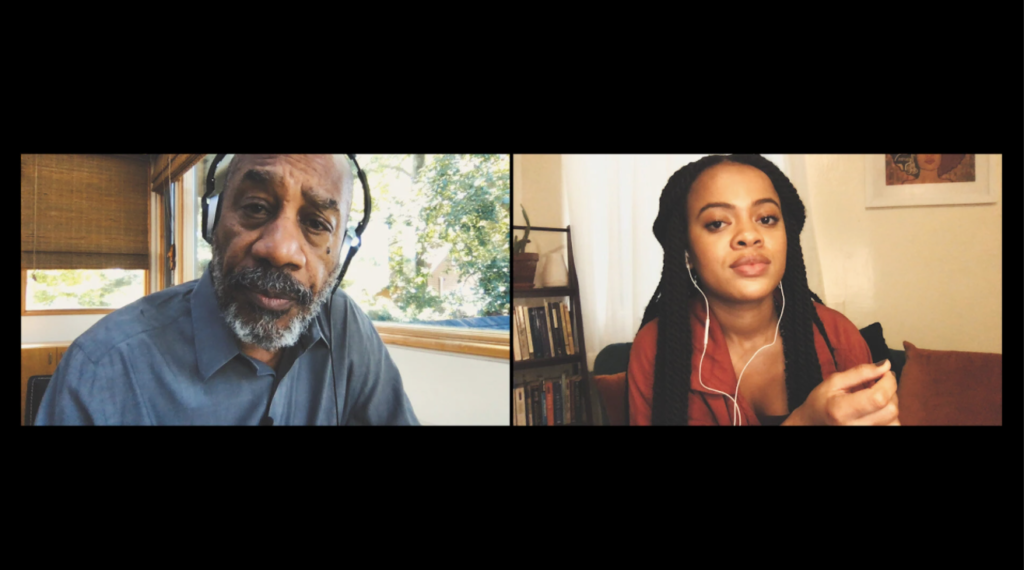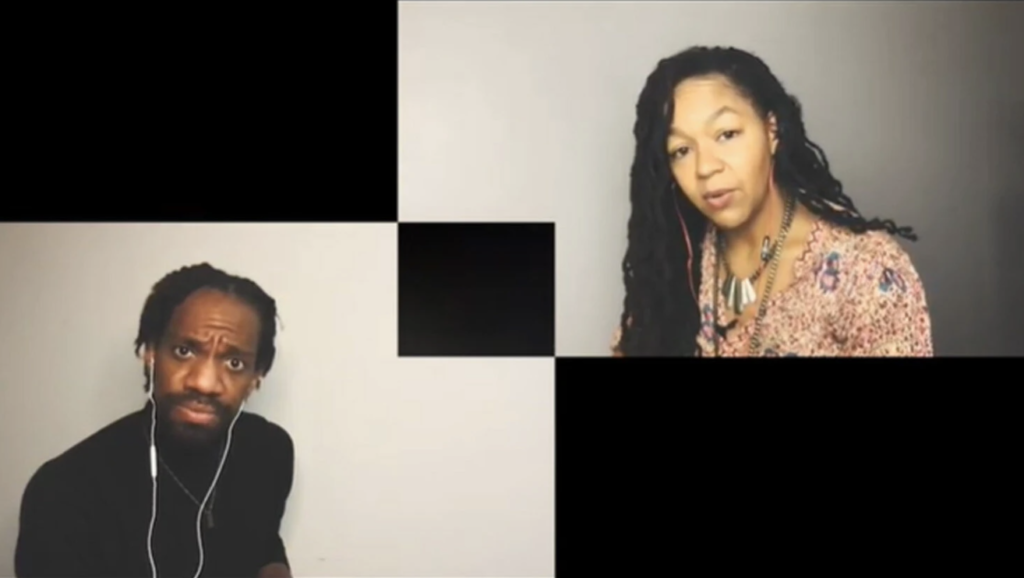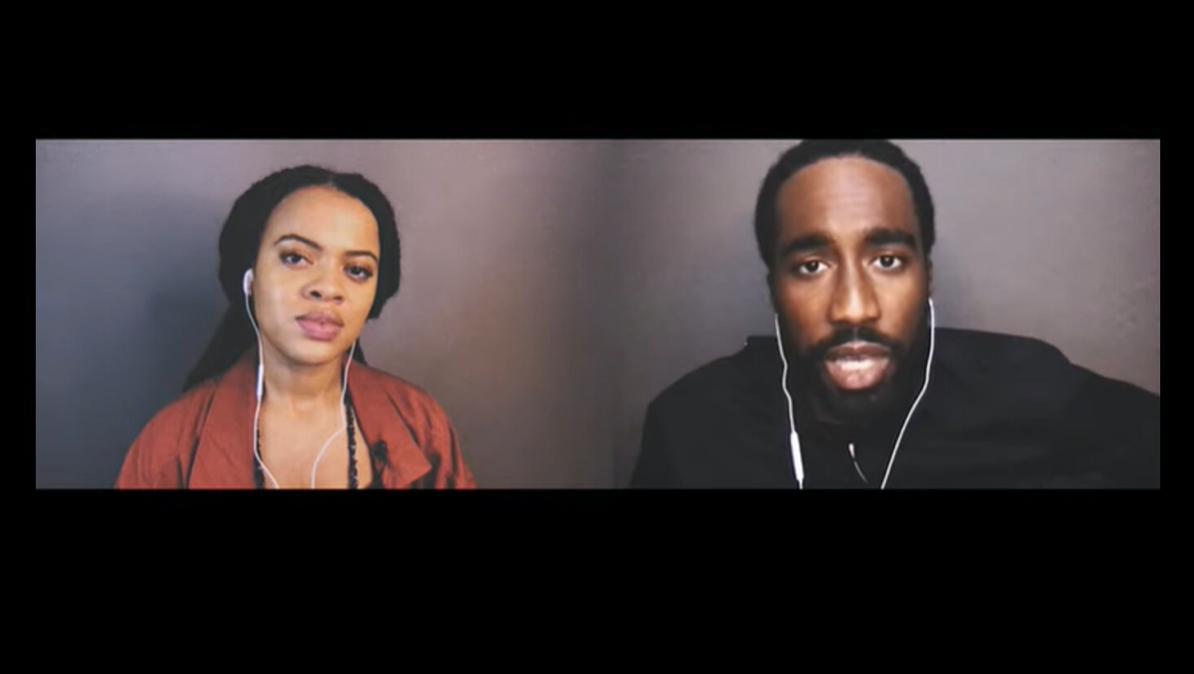“Those who cannot remember the past are condemned to repeat it.” Though George Santayana wrote these words in 1905, they still ring true. Sometimes we feel like we’re trapped in a neverending cycle of historical oppression, and there’s nothing that we can do. Most of the time, thinking about our current moment in the context of history just perpetuates this existential dread. The Vineyard Theatre’s Lessons in Survival fosters the opposite experience.
Devised by The Commissary, Lessons in Survival’s actors channel the voices of the Black artistic legends who became the voices of Black activism in our society. These performers present the ideologies of Maya Angelou, Nina Simone, James Baldwin, and many others by recreating their iconic interviews. Actually, the performers do more than “recreate.” With the use of in-ear technology, the performers are able to listen (and watch in some instances) the live recording of the interviews while they are reciting words. The simultaneous loop of hearing and speaking creates an experience of channeling as opposed to mimicking.

The group had been gathering weekly since the start of the year with the focus of devising a new play, but the nature of this work changed drastically after the murder of George Floyd. They decided that they needed to make their space intentional and designated Tyler Thomas as resident director.
Collaborator Kyle Bertram brought in a 1971 interview between James Baldwin and Nikki Giovanni. The interview was simultaneously soothing and inspiring to him, and he wanted to share that experience with his cohort. The group started to gather more and more interviews that elicited a similar experience. However, the group eventually decided that strictly dramatizing these interviews was not the right move. One of the conceivers of the project, Marin Ireland, said, “It feels very important to us that this keeps the humility for us inside of it very forward. I don’t think any of us who are participating in this project feel that we want any element of our own ego to be present…which is so unusual for something that is ultimately shared with an audience.” It was very important to the collaborators that these legends’ words remain entirely their own. Also, according to Ireland, the Commissary wanted to focus on collapsing the space between the past and the present. The experience of hearing the words of past legends through the mouths of contemporary artists creates a doubly conscious understanding of the importance of these words both in the context in which they were originally spoken and the context in which we currently live.
In this regard, the project is very successful. I have researched my fair share of Simone and Baldwin’s interviews, so I didn’t think that the Commissary had anything left to teach me. That was the past! This is now! I was sorely mistaken. Lessons in Survival placed me in the timeline of Civil Rights History. Director Tyler Thomas said, “It’s about how far we’ve come and how far we have to go. Are they talking about the 1960s or are they talking about the summer of 2020? This work continues to need to happen.” By no means did I think that we “overcame,” but I grossly underestimated just how specifically relevant these words would be.

There are a few lessons to be learned from Lessons in Survival. Perhaps the most presently important is how to have a difficult conversation. I watched Episode 5 of the project which featured interviews with Maya Angelou and Mavis Nicholson/James Baldwin and Mavis Nicholson in 1987. In both, the white British television host was able to discuss very sensitive subjects in reference to Black activism and the state of racism in America and the world. Angelou and Baldwin were respectful and articulate but very strong and never censored themselves; if Nicholson started to talk over them, they both immediately reclaimed the space to share their stories. Nicholson was by no means unbiased, but she never attempted to put words in the artists’ mouths and only really spoke in an attempt to more deeply understand and even probe the interviewee to explore their thoughts deeper. There’s a mixture of courage and humility that seems vital in conducting these kinds of conversations effectively.
Secondly, the project reinforces that 2020 is a moment in the long history of the fight for racial equality. “ I really want to underline ‘the fight being a long game,’” Tyler said, “That’s very core and common across the whole project. And the systemic nature of things.” We are not meant to have solved all of the problems that we inherited from our forefathers. Even our activist predecessors were aware that this fight was going to be a long one. Lasting change requires the tearing down of the systems built to continue to oppress, and that tearing down is not an easy or quick process.
The Commissary with the Vineyard Theatre plans to continue devising and producing content for the foreseeable future. Along with the release of full episodes, the Commissary is also inviting audiences into live rehearsals and hosting community talks. Episodes are recorded and streamed, and tickets can be purchased on the Vineyard Theatre website here.
To learn more about The Civilians and to access exclusive discounts to shows, join our email list at TheCivilians.org.
Author
-

Dezi Tibbs (they/she) is obsessed with exploring how we fabulate and perform our identities. As a freelance dramaturg, Dezi has facilitated the development of dozens of original and established plays and musicals with esteemed collaborators such as Sam Pinkleton, Lileana Blain Cruz, Max Vernon, Erin Courtney, and Truth Future Bachman. Dezi's theatrical work has been featured on stages and festivals nationwide including New York Theatre Workshop, Philadelphia Fringe Festival, Powerhouse Theatre, Joe's Pub, Baryshnikov Arts Center, Breaking the Binary, and Lincoln Center. You can read more of their writing on their blog Dezi's Thought Bubble, American Theatre, TDF Stages, and The Civilians' Extended Play.
View all posts









